Mosul battle: EU 'should prepare for returning jihadists'
- Published
Orla Guerin: "It could take months to drive the IS fighters from the city of Mosul"
The EU has been urged to prepare for returning jihadists if the so-called Islamic State (IS) is driven out of its Iraqi stronghold, Mosul.
Security Commissioner Sir Julian King said even a small number of militants would pose "a serious threat that we must prepare ourselves for".
Iraqi forces say they have captured 10 villages near Mosul since beginning their long-awaited offensive on Monday.
As many as 5,000 IS fighters are believed to remain in the city.
Government troops, moving in from the south, are currently some 40km (24 miles) from the city, while Kurdish fighters are some 30km to the east.
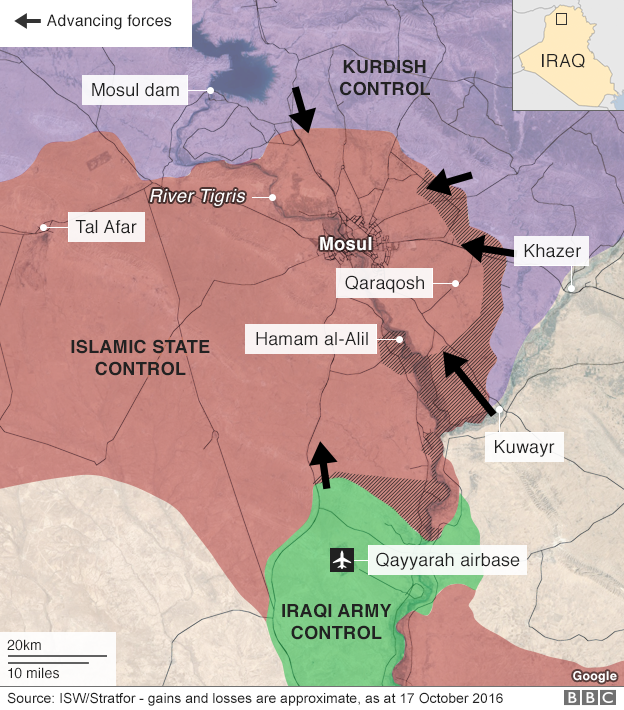
The International Committee of the Red Cross has appealed to all sides to show their humanity as aid agencies brace for what they say could be the largest man-made humanitarian crisis of recent times.
How big is the threat to Europe?
Sir Julian, a British diplomat recently made the EU's security commissioner, told Die Welt newspaper (in German), external that the threat of IS fighters returning to Europe after the fall of Mosul was "very serious".
There were currently about 2,500 fighters from EU countries in the combat zones, he said.
However, he stressed it was "very unlikely that there would be a mass exodus of IS fighters to Europe".
Similar cases in the past had shown, he said, that "only a few fighters come back". But he added: "I don't want to talk the risk down. Even a small number constitutes a threat."
Some of the militants involved in the deadly IS attack on Paris last November had recently returned from Syria.
What is the latest on the offensive?
Some 34,000 Iraqi security personnel, Kurdish fighters, Sunni Muslim Arab tribesmen and Shia Muslim paramilitaries have been deployed against IS, with backing from the US, France and others.
Photos from one of the freed villages, Badana, show the bodies of two suspected IS fighters.
IS has issued a video, said to have been recorded in the Mosul area, which shows militants firing at a distant column of armoured vehicles. One vehicle appears to be alight.
In another video, which purports to show fighters patrolling Mosul by night, an IS spokesman goads the group's enemies to engage it in battle.
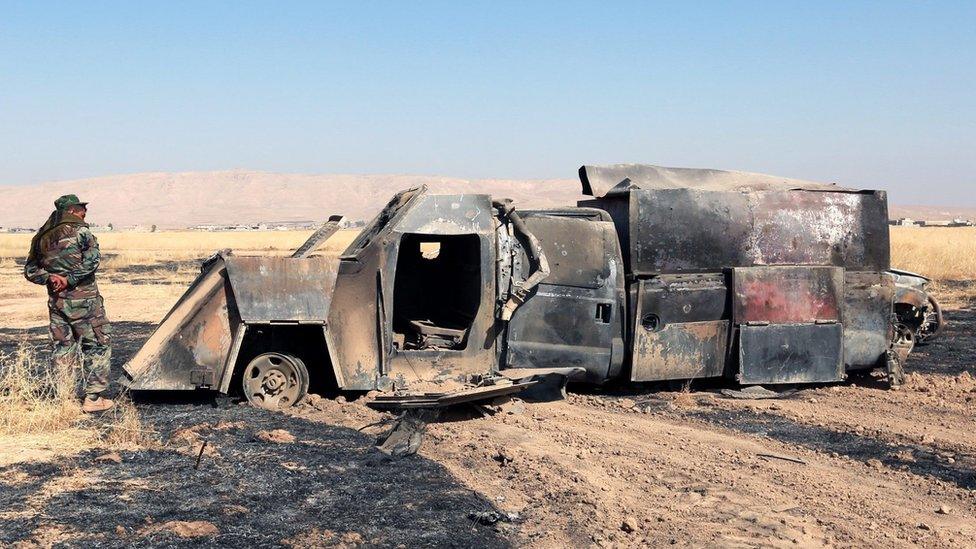
Kurdish fighters found a charred truck used by IS as they advanced on Tuesday
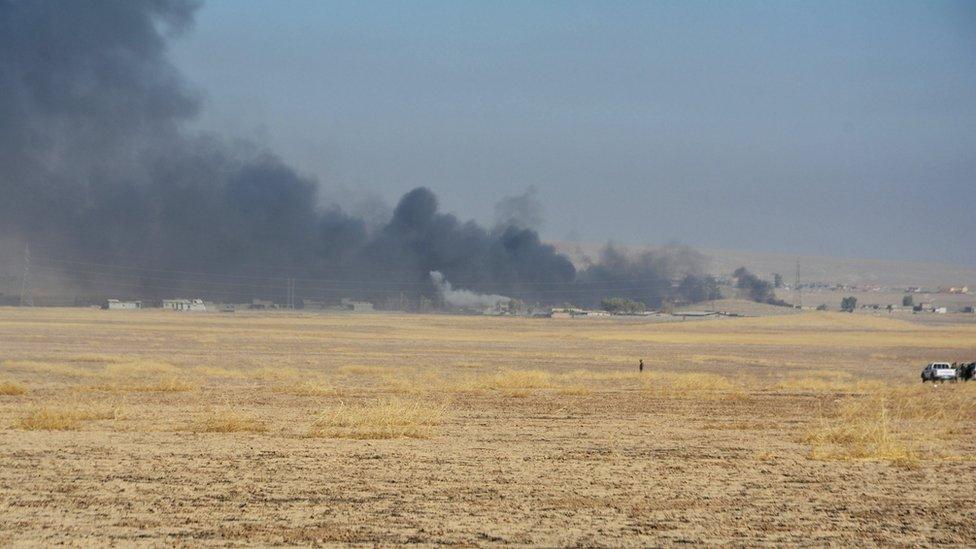
Smoke could be seen rising above Bartila, east of Mosul, after fighting on Tuesday
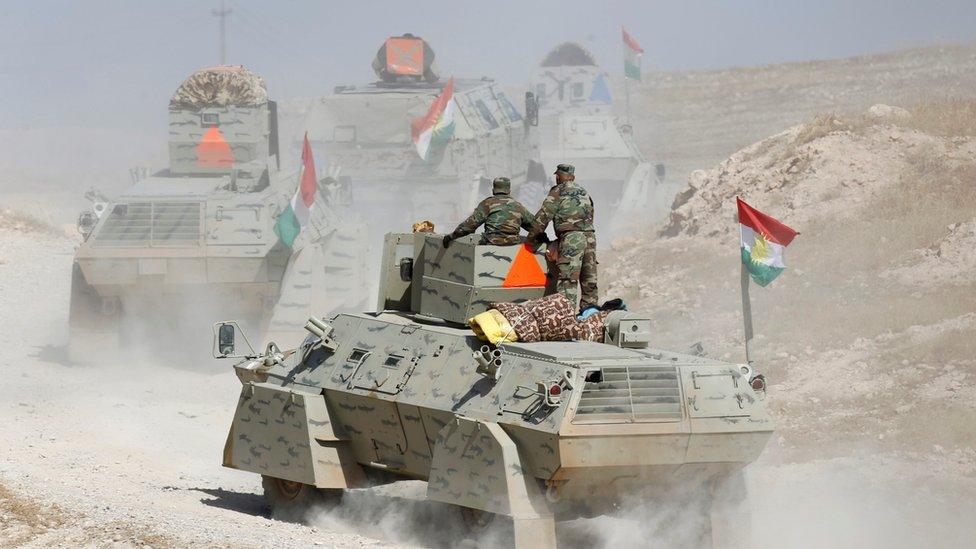
Kurdish forces are rolling in from the east
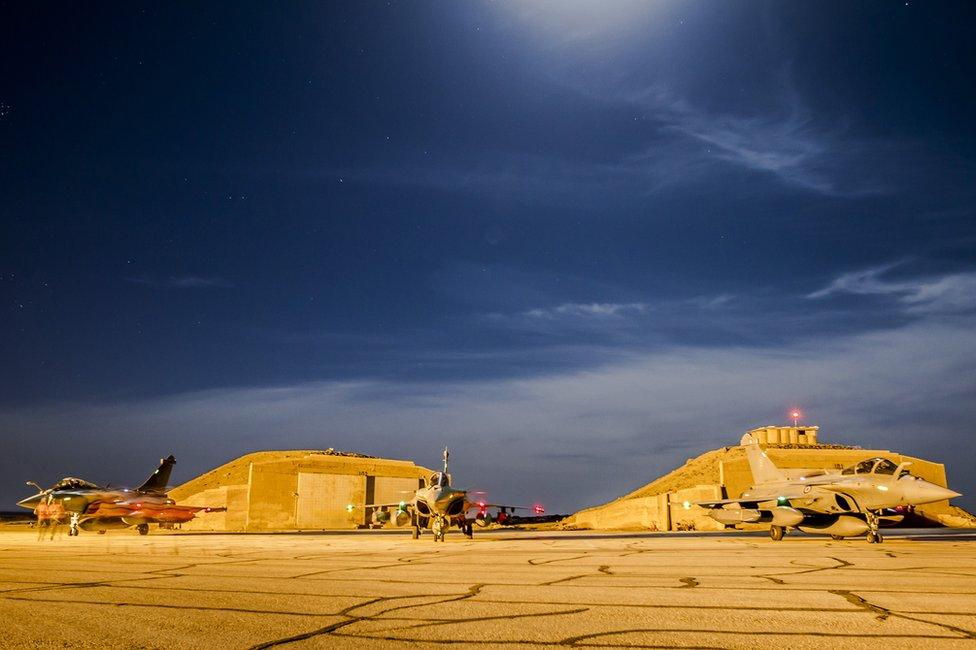
French Rafale jets have been bombing IS targets near Mosul
French Defence Minister Jean-Yves Le Drian has warned the fight to liberate Mosul in its entirety could take a long time.
"It's not a blitzkrieg," he said. "It's a city with 1.5 million residents, so it's a long-term project - several weeks, maybe months."
Meanwhile, the Syrian army accused the US-led coalition of planning to allow IS fighters in Mosul to flee into Syria, Reuters news agency reports.
The army, which has no control over Syria's border with Iraq, was quoted as saying it would resist any attempt by fighters to cross.
The commander of Iraq's Counter-Terrorism Service, Maj-Gen Fadhil Jalil al-Barwari, has been quoted by the New Arab website, external as saying IS fighters are being offered two corridors "to go to Syria".
How are civilians coping in Mosul?
Pentagon spokesman Navy Captain Jeff Davis told reporters on Tuesday that IS was using civilians as human shields.
"They are being held there against their will," he said in Washington. "We have not seen any change in the last day of people leaving or fleeing."
An Iraqi-American journalist who has been on the outskirts of Mosul and has relatives in the city said the situation there was currently calm.
Steven Nabil said people were feeling a mixture of excitement at the prospect of being liberated, and "stress and worry" over what dangers the offensive would bring.
Defence correspondent Jonathan Beale is with Iraqi army forces on the road to Mosul.
Phone lines had been re-established with the city in recent days, giving residents access to a free phone line.
"They've actually sent out hundreds of messages in the past hours telling the coalition" where IS locations are, particularly as they have moved into local neighbourhoods, Nabil said.
The UN is working to create new refugee sites outside Mosul amid fears that as many as a million people may be forced from their homes.
Lise Grande, the UN's humanitarian co-ordinator for Iraq, said the organisation was working on the assumption that as many as 200,000 people might need shelter in the first days and weeks of the operation.
US President Barack Obama said on Tuesday, "We have put together plans and infrastructure for dealing with a potential humanitarian crisis that are as extensive as the military plans."
Why does Mosul matter?
The oil-rich capital of Nineveh province was Iraq's second-largest city when IS militants overran it in June 2014, but many inhabitants subsequently fled.
Its capture became a symbol of the group's rise as a major force and its ability to control territory, and it was there that IS leader Abu Bakr al-Baghdadi proclaimed a "caliphate" in parts of Iraq and neighbouring Syria.
Caroline Hawley explains why the battle for Mosul matters so much
The city was one of Iraq's most diverse, comprising ethnic Sunni Arabs, Kurds, Assyrians and Turkmens, as well as a variety of religious minorities.
While members of those minorities largely fled the onslaught by IS, many local Sunni Arabs initially welcomed the militants, angered by the sectarian policies of the previous Shia Arab-led central government.
One major concern for those still there is the involvement of Shia militia groups in the offensive.
The commander of one of the main groups, Hadi al-Ameri of the Badr Brigades, sought to reassure Sunnis on Tuesday by saying only the Iraqi security forces would be allowed to operate inside the city.
Meanwhile, in Baghdad thousands of followers of Shia cleric Moqtada al-Sadr demonstrated outside the Turkish embassy against the presence of Turkish troops at a base near Mosul.
Even if IS is driven out of Mosul, the group will still control areas of northern and eastern Iraq.

Are you in the region around Mosul? Are you from Mosul? Let us know about your experiences. Email haveyoursay@bbc.co.uk, external with your stories.
Please include a contact number if you are willing to speak to a BBC journalist. You can also contact us in the following ways:
·WhatsApp: +44 7525 900971
·Tweet: @BBC_HaveYourSay, external
·Send an SMS or MMS to +44 7624 800 100